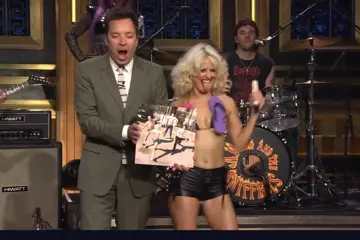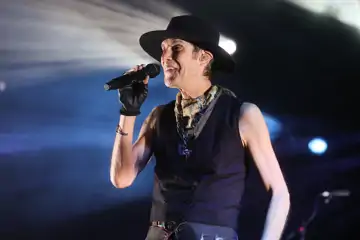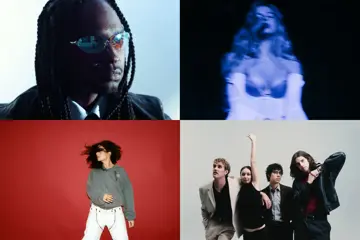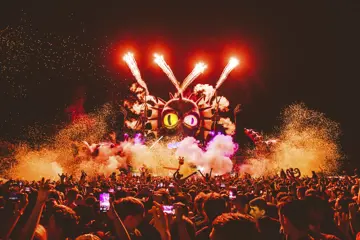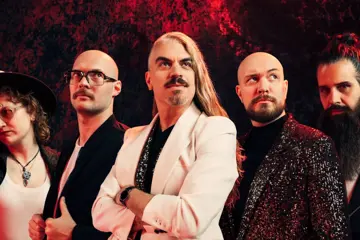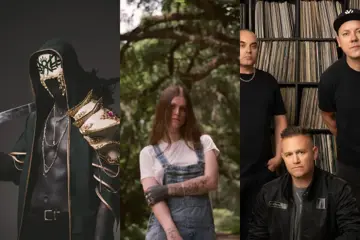For over two decades Texan-bred art-rockers ...And You Will Know Us By The Trail Of Dead have been marching resolutely to the beat of their own drum, melding punk rock intensity with prog-leaning tendencies and unbridled artistic ambition to create a brand of rock'n'roll quite unlike anything seen or heard before or since.
Founding members Conrad Keely and Jason Reece — long-time friends since before they started the band — are the band's heartbeat to the point where they constantly switch between vocals, guitars and drums (both onstage and in the studio) and share creative control equally. These days Reece still calls the Texan city of Austin home but Keely has ensconced himself in Cambodia, which is where The Music catches up with him as he recovers from some early touring for their most recent long-player, IX.
"We just did Europe and that was awesome. We did some really great festivals up there," Keely enthuses. "We got to play some places we hadn't played before and we went back to a couple of places like Athens — that was great — and Zagreb, then we played in Madrid for the first time. It was nice."
You'd imagine there would have been a strange vibe in Athens given Greece's ongoing economic turmoil, but Kelly says it was pretty much business as usual in the capital. "You couldn't tell politically what was going on. Musically they were really great. That was one of the better audiences of the whole tour. I got the feeling that people there weren't judgmental about music, they were all just music lovers. So we had a great crowd for that; it was a really great show and I really enjoyed it. But as far as the economic crisis and all that, I honestly wouldn't have known except for the fact that things were a lot cheaper. We weren't there during a crucial time, things hadn't heated up to the point where they are right now.
"Having said that, the first time we were in Athens a few years before there were protests there, and that was for something completely different. It's one of those places where the political voice of the people can be really felt on the street. But day-to-day life goes on, and most Athenians will even tell you this, that they'll do the protests and stuff but you get away from that and people are really just having to get by the way that they've always done. I think for some people who are poor or just getting by anyway things definitely get worse, but it's not like they change that drastically."
Has the new material from IX been crossing over well onstage?
"Yeah, it's been great," Keely enthuses. "On a couple of songs we've had guest musicians come up and play with us, but for the most part the new songs have been translating pretty well live. But we're nine albums in now, so whenever we're playing a show we kinda have to play something from all the records, so we tend to span our entire repertoire when we play."
The ...Trail Of Dead aesthetic has changed significantly between albums across their career but Keely explains that this has been more accident than design.
"We're never actually looking for directions in that sense. It's not like there's ever a conversation where we're sitting down saying, 'What direction should the next record go?' or whatever. We always just use wherever our lives are at or whatever we've been listening to and whatever's been inspiring us musically as the cue for whatever music we're writing. So it's always been a really organic process, it doesn't really start with any kind of concerted effort to try to do something we haven't done before. That comes naturally.
"Every album we do, if anything, starts with an idea for an experiment. And the experiment that we wanted to try with this one is that we wanted to see what would happen if we came to the recording session with no songs at all. Unlike [2012's] Lost Songs when we'd gone to the recording session having had nearly all the songs demoed prior to starting, for this session when we showed up we didn't have anything — we didn't have any music. So we spent the first three days just improvising.
"But it was a lot more of a stressful process because in that sense we didn't have any idea how the music was going to turn out — none at all. So it was a little bit more frightening, but the way it turned out is how it turned out. We started with just improvisations and we just built on the improvisations and the songs came out of those. Originally we'd even considered the idea of leaving them all instrumental — they way that they were written — but we're not really an instrumental band, and when it comes down to it we have something to say with our lyrics. I know I was going through a lot at the time with my personal life, and the lyrics came — there were no two ways about it, I had stuff to sing about and stuff to write about so it ended up being a lyrical record."
Despite the blank slate they had when hitting the studio the music came quickly when the four members came together. "The improvs came quickly, in fact we've got hours and hours of stuff that didn't get on the record. As far as it's the one record where we had tons of music, on none of our previous records has there ever been any leftover music — everything we worked on went on the record — whereas with this one we've got days' worth of stuff which could be used for soundtracks or other songs."
This current ...Trail Of Dead line-up — rounded out by Autry Fulbright II (bass) and Jamie Miller (drums) — has represented a sustained period of stability for the previously fluid outfit, even though their tenure together is still just shy of five years.
"Yeah, this version of the band just clicked," Keely admits. "Sometimes it takes a while to find the right chemistry when it comes to bands, yet the chemistry is such an important part of being in a band. It took several line-up changes for us to get to the point where we felt, 'Well this is fixed and we don't want to change it.' If it ain't broke, don't fix it!"
Is that rapport a substantial benefit when going freeform in the studio as they did with IX?
"Sure, but it doesn't stop us from being challenged. If you took the challenge away then it wouldn't be the same. You need that form of tension, and this time that tension came from us not knowing necessarily what we were going to do. We had to rely upon the trust of us understanding each other on a more visceral level, or intuitive level.
"[Going in with no songs] was a conscious effort — that was our experiment. The idea was, 'Look, let's just not worry about having anything prepared, let's just show up and see what happens.' I don't think that we'd really do that again," Keely laughs uproariously. "Now that we've done that, it's off the bucket list."
There's a strong lyrical theme running through IX, one that contains some rather personal tropes.
"For me it was separation. I'd separated from my partner, and we'd just had a kid together, and Jason had lost his father the year before that," Keely explains. "So there was a sense of melancholy and loss that kind of came naturally because that was what we were experiencing personally. Those feelings came into the album inevitably, and I think art can be a therapy for that. I mean it's difficult to deal with those things in life, and art makes it that much easier to give it voice — to give voice to those things."
How important to the ...Trail Of Dead aesthetic is the long-term chemistry between Keely and Reece?
"I think as time goes on we realise how important it is even more now that we've been working together so long. We're very forgiving of each other. I would say that Jason is probably more forgiving of me because I'm like the temperamental artist type, but we understand each other on a level where we know each other's strengths and weaknesses, and we can draw upon this shared history. Especially our musical vocabulary is so intertwined, there are bands and stuff that only we would know about or seen together because we shared this musical past."
Is that bond eroded at all by the tyranny of distance now that they live on different continents?
"No, not really," Keely offers. "I guess on a day-to-day level it might be like that, but you know how it is with old friends when you get back together and it feels like no time has gone by — it's more like that. The distance is just something that can't really be helped. I think he understands that Austin isn't really a place where I would necessarily want to be right now, and the same with Autry and Jamie — they're in LA. They might as well be on the other side of the world [from Austin] as well. But I'm pretty sure that if we did all live in the same town that we wouldn't all see each other when we're not working musically anyway; we've all got our lives and we're all busy with other things. I'm pretty dedicated to doing visual art when I'm not on tour, and that keeps me pretty tied up. I'm the predominant designer of all of our artwork."
There's been a baroque thread though the ...Trail Of Dead artwork since the very early days, and Keely explains that he enjoys this facet of the band's creative endeavours as much as he does the music.
"I enjoy it just as much, and for me it's pretty much almost one and the same. However I would have to say that I find art a lot more challenging because unlike music where I feel that I've gotten to a point where I've learned and know enough about composition and recording to do what I want to do, with art I still feel like I've got a lot to learn and I'm constantly struggling to learn more than I know in order to create the images that I want to create. I think with anything creative you don't want to feel like you know everything — even with music I've been learning a lot right now because I've been working on a solo record for the first time with some friends, and I've had to learn a lot more about the actual nuts and bolts of recording that I'd never really bothered to learn before. So even with music I've never got to a point where I feel like I know everything I want, so that will always keep it interesting."
Keely reveals that his impending solo release differs from his ...Trail Of Dead output but is still very much a representation of his own self. "Again it wasn't a conscious effort to create something different. I've only ever written whatever I'm in the mood for at the time. Although I have to say that having the liberty to create something that's outside of our rock paradigm I was given more freedom to explore other textures and stuff that I might not usually do with Trail, so yeah, it's been really exciting. I'll be touring some of that next year."
When ...Trail Of Dead first burst onto the scene they were renowned as much for their hell-raising as they were their music, with tales abounding of them fighting their way out of rough Texan venues with their guitars. Did they expect they'd survive this long as a functioning outfit?
"I think we did," Keely smiles. "We might not have discussed it or anything, but I think it was just an unspoken thing between Jason and myself where we knew that even if it didn't work out for whatever reason and we couldn't make a living out of it that we'd probably just keep doing it anyway, because that was just what we wanted to do. That was just what we did. It wasn't as if there was that much of a choice involved — what were we going to do, go back to school and get degrees in something completely different? Being musicians and composers was who we were, so there was never a discussion about quitting or doing something else. Even as far as making other music or writing with other bands, we based this band so much around our personal tastes and what we thought music should be —it's just the kind of music that we wanted to make. And honestly it doesn't seem like 20 years, it seems like five or six."
Keely does concede the band's trajectory isn't quite what his younger self might have been expecting, although he has no regrets about the path he and his band have taken.
"I probably would have been disappointed if anything because I'm extremely ambitious, and I've always dreamt of massive arenas and stuff like that," he chuckles. "But in a way with the music that we ended up deciding to make, that path would have made no sense. At least in the modern landscape of what pop music is these days, I would never have compromised the music that we make in order to get some superficial success that making pop music would have afforded us. That was never in question, we were always going to make the kind of music that we made — and admittedly a lot of times that music was deliberately non-commercial."

